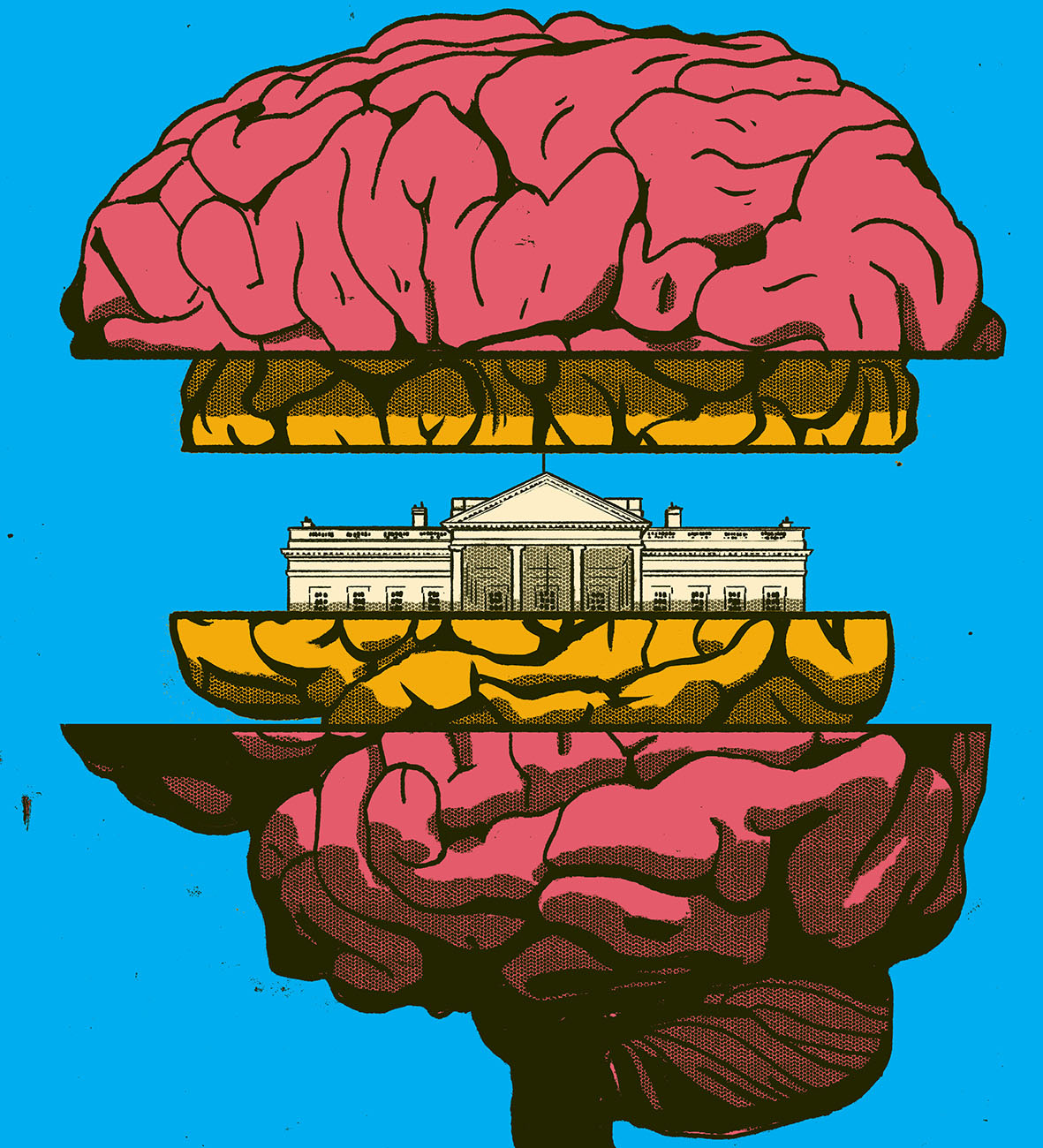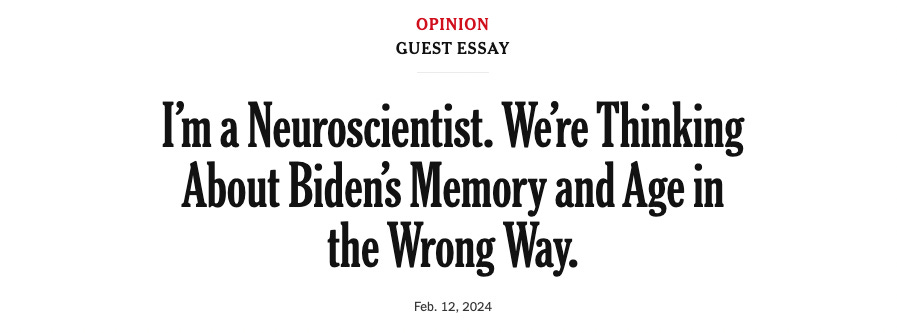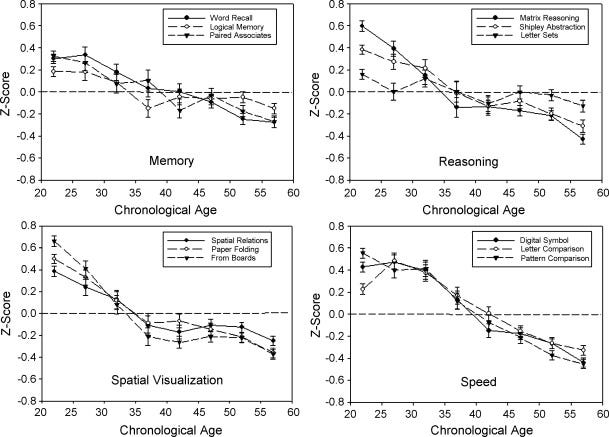I'm a neuroscientist. Our presidential candidates have shrinking prefrontal cortexes.
Contra The New York Times

What could be more authoritative than “I’m a neuroscientist” to start a title with? For that was the headline in The New York Times this week.
As the brief and ill-argued essay bravely declares:
Ultimately, we are due for a national conversation about what we should expect in terms of the cognitive and emotional health of our leaders. And that should be informed by science, not politics.
Sounds good. Right now, if you turn on Fox News, you’ll find speculations about Joe Biden’s mental fitness at 81. And if you then turn on CNN, you’ll find speculations about Donald Trump’s mental fitness at 77. Currently, there’s more heated debate about Biden’s cognitive decline due to the special council report recommending no prosecution of Biden’s mishandling of classified documents because, essentially, his (claimed) cognitive decline would make jury conviction impossible. But the focus of attention could easily change if Trump has more mix-ups like he has in the past (e.g., a few months ago he repeatedly confused Nikki Haley with Nancy Pelosi for a significant chunk of time).
Personally, I think it’s tough to tell the exact degree of cognitive decline from public flubs. I too think, as the The New York Times article claims to, that we should have a “national conversation” that is “informed by science” about the 2024 candidates being the two oldest people to ever run for president (beating the previous record that they themselves held). Unfortunately, such a conversation is not going to happen in the Times. For to have such a conversation, you’d need to make use of outside links and cite neuroscientific data and stuff like that. And, as for most Times articles, there are few outside links: in fact, the author, Charan Ranganath at the University of California, Davis, only cites a single paper. Instead 99% of the article is handwaving speculations like:
Mr. Biden is the same age as Harrison Ford, Paul McCartney and Martin Scorsese. He’s also a bit younger than Jane Fonda (86) and a lot younger than Berkshire Hathaway CEO Warren Buffett (93). All these individuals are considered to be at the top of their professions, and yet I would not be surprised if they are more forgetful and absent-minded than when they were younger. In other words, an individual’s age does not say anything definitive about their cognitive status or where it will head in the near future.
It’s impossible to just pass over reasoning like this: frankly, Harrison Ford, Paul McCartney, and Martin Scorsese did their best work decades ago; they’re not at the top of their professions. Nor is it possible to pass over such illogical progression. First there’s the admittance that the figures “are more forgetful and absent-minded than when they were younger,” followed by a sentence that then immediately says the opposite: “In other words, an individual’s age does not say anything definitive about their cognitive status.” What?
Putting aside the logical nit-picking, neuroscience does make clear that an individual’s age says something about their cognitive status and where it will head in the future. Does it tell you something “definitive?” Well, not all swans are white, sure. But, as the pomposity of my title tells you, I’m something of a neuroscientist myself, and the unfortunate truth is that age-related cognitive decline is real and to be expected and is almost certainly affecting both Biden and Trump. Simply because it’s well-known that age-related cognitive decline starts around or before 30 and basically never ever stops.
This doesn’t mean you can judge, in a definitive manner, the degree of cognitive decline merely based on the age of an individual. But you can tell a lot. While some individuals show little cognitive decline, usually it’s for tests for one particular attribute. E.g., you can find studies where 22% of the elderly show no significant decline on a memory task, but that’s just examining a single memory task; if you examined a battery of tests, you’d get a different result. Dr. Ranganath admits the “on average” decline part but then claims that there are “super-agers” who “remain as sharp as ever.”
Age is, on average, associated with decreased memory, but studies that follow up the same person over several years have shown that although some older adults show precipitous declines over time, other super-agers remain as sharp as ever.
The single citation that Dr. Ranganath references is a review that argues a minority of the 70+ demographic are “super-agers” who don’t show cognitive decline (tracked over a few years, at most). First of all, there’s the separate question of if we think that Biden and Trump fall into this category and are, indeed, “as sharp as ever.” But there’s a scientific issue as well. Readers who don’t look closely at the data won’t know that by “super-agers” the researchers mean things like people who are 80 but have the average memory capabilities of someone who is 60. And even this is statistical sleight-of-hand, because this is comparing the best of the old to the average of the young, and finding that, in a minority of cases, some of the elderly can achieve approximately the same value on some cognitive tasks as if they were a few decades younger.
However, there’s no real proof for super-agers unaffected by cognitive decline that can’t be explained by higher starting-points, variance in the rate of decline, and also variance in the test scores at re-testing. As often is the case for neuroscientific claims, what starts as a strong “super-agers are unaffected by cognitive decline!” becomes the less interesting but more defensible “some people age better than others,” which is obviously true. In general, the methodologies are questionable. Taking a population and scoring them at year 80 and then later on year 84 and finding there was, say, a 6% or a 10% or a 40% (note the variability) subset who didn’t decrease in their test score across the 4 years, and then by model-fit fiat declaring this non-decreasing subset are special super-agers? Some percentage of people will do equally well on a memory test after a couple years simply because of chance, or because the initial test under-rated them, or because they know what to expect from the test, or merely because their rate of decline is not steep enough for the test to pick up, and so on. All the real significant group-level statistics show an average decline, and the percentage of special “super agers” who still have high scores is extremely variable between the few longitudinal studies, none of which span the necessary time to ensure someone is really immune to decline.
Maybe Dr. Ranganath could mount a better defense of what he thinks the literature’s position is in some other form, and also specify why we should believe that either Biden or Trump classify as a “super-ager” who is exactly as sharp as they were 50 years ago—but this article certainly doesn’t do that. It elides that, if there’s scientific consensus about anything within neuroscience, it’s that cognitive decline from aging is basically universal and can, at best, be attenuated and slowed, not fully resisted. The decline crosses species, and there are clear biological mechanisms behind it, like the literal loss of brain volume over the decades. Which is why it’s easy to find scientific abstracts that start with statements like this:
Brain aging is characterized by the progressive and gradual accumulation of detrimental changes in structure and function, which increase risk of age-related cognitive decline and dementia.
If we accept neuroscience’s conclusion that aging affects all brains to some degree, does this mean that the elderly, not being at the height of their mental sharpness, are worthless? Of course not. Does it mean that the huge amount of wisdom and experience they’ve accumulated should be ignored? Of course not. Is all age-based cognitive decline the same as early-onset dementia? Also no. There are indeed some people aged 80 and over (as both candidates will be by the end of their 2nd term) who make great CEOs and leaders. But such cases does not mean that the association between advanced age and mental alacrity is untrue in some subset of special people. Warren Buffet at 93 is not operating with the mental clarity of Warren Buffet when he took control of Berkshire Hathaway at 32. There is absolutely no scientific evidence that maintaining perfect youthful cognition is possible at all for humans. And yet, according to the Times:
… age in and of itself doesn’t indicate the presence of memory deficits that would affect an individual’s ability to perform in a demanding leadership role.
Well, it depends on how we define “indicate” here, but what’s definitely true is that a loss of executive function is an expected signature of aging in neuroscience, and executive function is precisely what’s needed in a “demanding leadership role.” As a recent scientific review of cognitive decline started with:
Executive function (EF) is a complex construct that reflects multiple higher-order cognitive processes such as planning, updating, inhibiting and set-shifting. Decline in these functions is a hallmark of cognitive ageing in humans, and age differences and changes in EF correlate with age-related differences and changes in association cortices, particularly the prefrontal areas.
And the review includes casual statements by the authors like:
Negative associations between age and EF in healthy adults are well established.
It’s shocking easy to find age-related cognitive declines in tasks like the Wisconsin card sorting task, visual working memory, and the more, and this holds up in longitudinal studies; it’s been a consistent finding for decades. Biologically, we even know that the prefrontal cortex shrinks in size, about 5% per decade, which over time means highly significant volume changes.
Which is probably why Dr. Ranganath, the author of the Times article, is also the author of papers with titles like “White Matter Changes Compromise Prefrontal Cortex Function in Healthy Elderly Individuals.”
Quick question: do you think that maybe you need executive function to run the executive branch of the US government? If the nation is itself a brain, the White House is supposed to act like the nation’s prefrontal cortex; strip its white roof off, and then within the Oval Office peel back a further skull, it turns out we’re stacking much smaller real prefrontal cortexes within our nation-wide one, like a Russian doll. No matter what, in 2024 it will be only a little gray wrinkle at the end of this process, governing almost everything.
Does literal brain shrinkage mean that the next president will be incapable simply due to their age alone? No. Obviously we shouldn’t reason like that. I’m not a biological determinist about this sort of thing, and in many cases cognitive attenuation or loss can be compensated for by other traits, like wisdom or experience. That’s a decision the voters make. As for Trump and Biden, statistically they might make it through just fine, and it’s the last term for them anyways. But advanced age does have an undeniable effect on cognition grounded in biological reality and pretending science provides some clear path out of the issue where certain special super-agers are completely unaffected by cognitive decline is (putting it charitably) extremely tenuous. Even setting aside everything cognitive, it’s a morbid truth that the average life expectancy for men in the US is ~77, and the chance of a man who is 80 dying by 85 is about 31%. So it’s well within the realm of possibility that a vice president finishes out either of their terms, for any number of reasons, including because of cognitive decline.
As of right now, Biden doesn’t seem like he’s going to be taking another cognitive test. Meanwhile Trump gets sketchy doctors who say things like “Trump is healthier than a draft horse!” There’s not even going to be a presidential debate this cycle. But can we please, just please, be honest about our presidential candidates not being magically immune to cognitive decline? People have eyes and ears, and scientists don’t have a bunch of prestige left to burn of late.





"...can we please, just please, be honest about our presidential candidates not being magically immune to cognitive decline? People have eyes and ears, and scientists don’t have a bunch of prestige left to burn of late." Thank you.
It’s forever baffling to me why psychoanalyzing candidates in the press is off-limits (for good reason, at least the vast majority of the time) but the neuroscience equivalent (or frankly pseudoscience—body language “reading” etc) is uncritically given a free pass